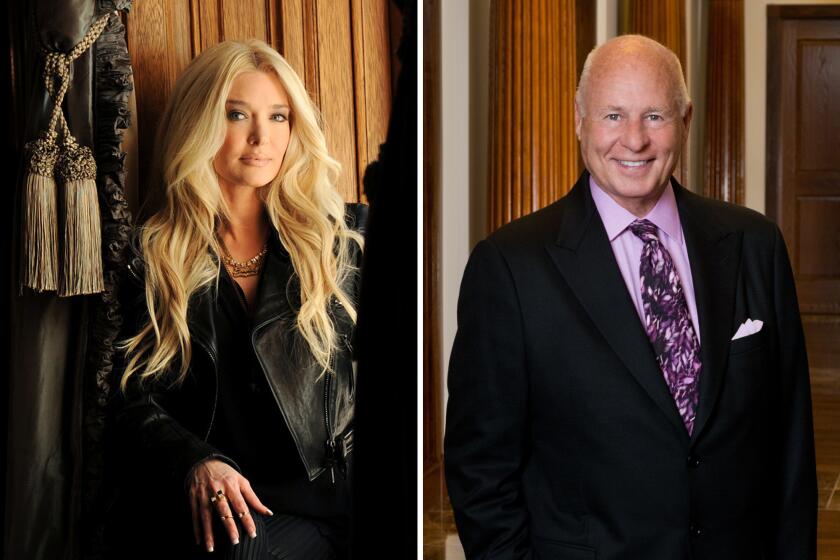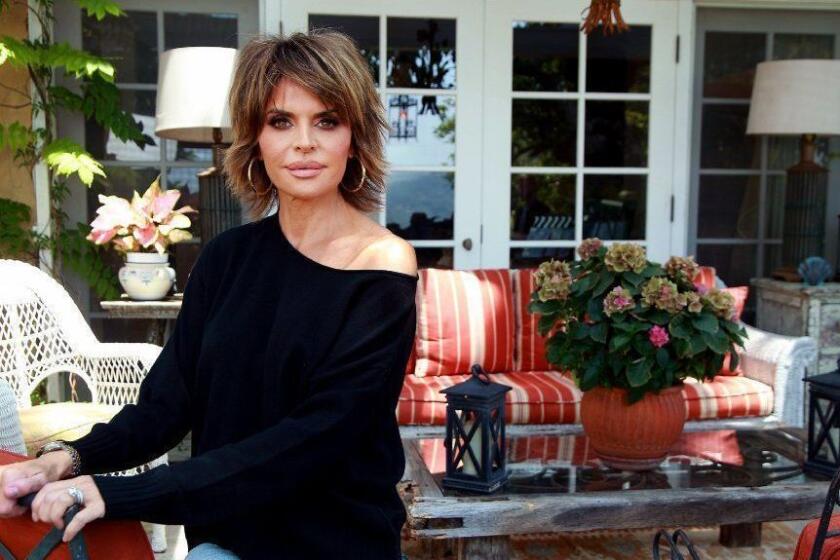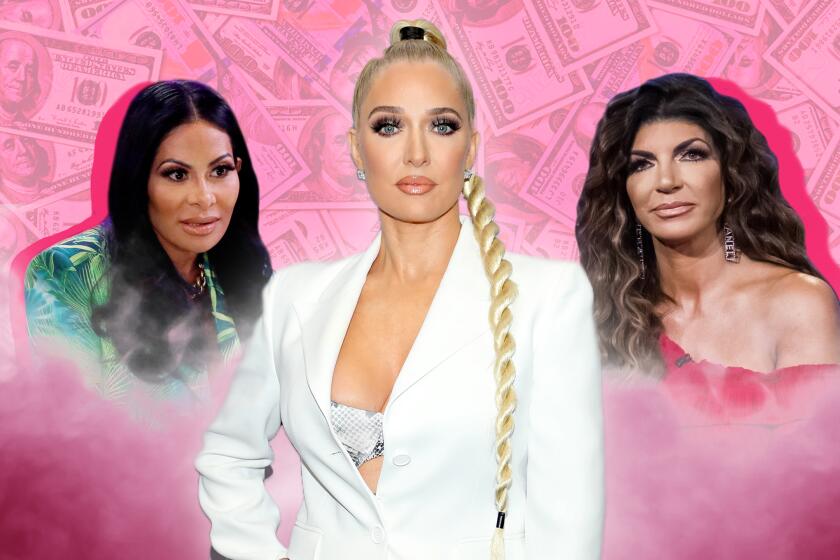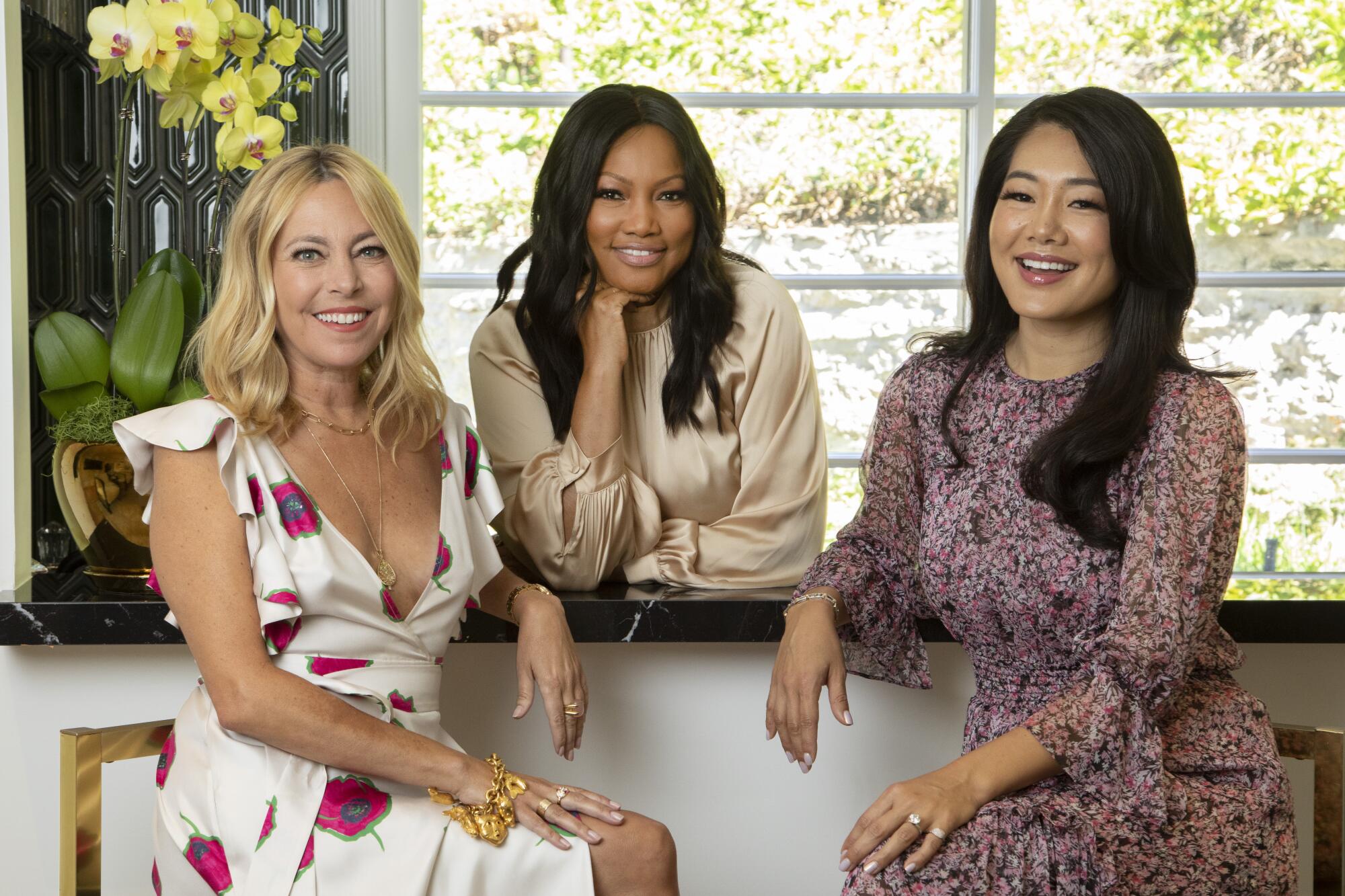
- Share via
The scene inside Sutton Stracke’s Bel-Air home on a recent afternoon might have been expertly prepared by the editors of “The Real Housewives of Beverly Hills.”
Still a construction zone when it made its debut in the current season of Bravo’s reality series, which concludes Wednesday, the nearly completed space now boasts elegant floral arrangements and walls decked with art like Barbara Kruger’s “Who Will Write the History of Tears?” Stracke is playfully posing for photos alongside fellow “Housewives” Garcelle Beauvais and Crystal Kung Minkoff while Taylor Swift’s “I Forgot That You Existed” pulses without irony — albeit muffled by the clinking of Stracke’s dangly bracelet, the sort of detail that almost inevitably becomes a tongue-in-cheek meme.
It’s been a few weeks since the trio filmed the Season 11 reunion and, judging from their bubbly interactions, it’s clear they’re all on speaking terms.
The complete guide to home viewing
Get Screen Gab for everything about the TV shows and streaming movies everyone’s talking about.
You may occasionally receive promotional content from the Los Angeles Times.
And in the “Housewives” universe, there may be no truer test of friendship.
In an already explosive season fueled by curiosity over Erika “Jayne” Girardi’s involvement in her estranged husband’s embezzlement scandal, Stracke, the owner of the fashion boutique Sutton; Beauvais, an actress and producer who currently co-hosts “The Real”; and Kung Minkoff, co-founder of coconut beverage company Real Coco and wife of filmmaker Rob Minkoff — the cast’s least seasoned members — have helped reenergize fans by raising issues of race, money and the aesthetics of leather pants. Not always delicately.
As viewers prepare for a showdown in the four-part reunion, which begins next week, Beauvais, Kung Minkoff and Stracke sat down with The Times to discuss how legal scandal swept up the season, tackling the topic of race of reality TV and stocking up on leather pants.
Times reporting has played a starring role in ‘The Real Housewives of Beverly Hills’ this season. Here’s our guide to Erika Jayne and Tom Girardi.
What has surprised you most about what you get in being on “The Real Housewives of Beverly Hills”?
Stracke: It elevated my business more than I ever thought it would. I’m kind of playing catch-up. I had to accelerate a lot of things. And it’s kind of intimidating a little bit, speaking of family and all that. I had a hard time with my ex-husband; coming from a finance place, we’re very private. And the banking industry is very private. So this is very, very foreign for me. And so, then, all of a sudden to be pushed into this has been kind of like the world turned upside down. And the freedom that I now have being divorced and getting to make my own decisions has really let me soar in a way that I didn’t expect.
Knowing what you get with this franchise — the good and the bad — what interested you in joining the show in the first place?
Stracke: I thought it was just going to be an adventure and something new and completely different for me. And I didn’t know what I was getting into. I had no idea what it was going to entail at all, truly.
Beauvais: Because you had never done TV?
Stracke: The short burst of the [reality show] that I did years ago, that you obviously haven’t seen? [teasing] I really didn’t know what was going to ensue. I had no idea how deep it was gonna get.
Beauvais: I knew the franchise, I have friends on the franchise, and I was looking for something that would keep me home. My kids were going into middle school, and I really didn’t want to travel as much as I was. So I thought, “Yeah, let’s go for it. Let’s try something new.” And I’ve always done other things like hosting, producing, writing. And so it was just another thing to try. And I thought it’d be fun.
Did Denise [Richards], or even Lisa [Rinna], warn you about what to expect?
Beauvais: Denise would say “girllllll” — and I got what a “girllllll” meant. And Rinna just told me, “It’s the hardest thing I’ve ever done, but it’s also the best thing I’ve ever done.”
Kung Minkoff: I don’t disagree with that. I never thought about [joining the show], it just sort of approached me. And I was super reluctant — just exposing my family and stuff like that. I was asked during the height of [Black Lives Matter], and so being a minority, I just felt a kindred connection to that; of course, the anti-Asian thing happened quickly after. And so when I thought about it, I was like, you know, if I don’t do it, they’re gonna pick someone else, and they might not be Asian. And then that’s one less person in the AAPI community that won’t be on TV, right? So then it just was this constant, like, pressure of representation that I take very seriously.
To expand on that a little bit: The way race has been dealt with on some of the other franchises recently has been very volatile and concerning. Garcelle and Crystal, did you come in feeling like you had to navigate this space a certain way or make it part of your mission in joining the cast?
Kung Minkoff: It’s never been my mission but it has sort of grown with me through this process. For me, the representation was, I’m going to come into this sort of very Caucasian world that I live in in my real life, and then the audience will get to see how easily integrated someone of color is in this world. And I didn’t realize how, not necessarily in the cast, but how challenging that looks to people who watch the show. Every single day, I get the word “chink” in my DMs, or “kike.” Every day. And it’s interesting because I think I’ve asked [Garcelle], like, “Do you get this?” I don’t know what it is about the Asian experience.
It was totally not expected because I’ve always been so included. I grew up here and maybe it’s just super diverse or I was just so blind to it. I never felt like a true outsider. I never experienced that until the show. Half of me is sometimes: I just want to be done, stay in my room and go back to my normal life and pretend like nothing ever happened. And the other side is like: I need to do it for that girl in Minnesota who just messaged me. If it’s that one girl, like, I need to do something for her.
Beauvais: I felt like when I was asked to join, I didn’t even have to say anything. Everybody was like: “The first Black woman ...” So, you know, I realized that, and I was up for the challenge. But I didn’t think that some people would have reactions about some of the topics we talked about. I know some people on social media are like, “We watch the show for entertainment. Why do you have to talk about race?” And my answer to that is: I was brought in so that we can have diverse representation, diverse conversations, cultural differences. So within that you’re going to have to have conversations. And if this is truly a reality show, you will see my reality as a Black woman. It’s not like I’m putting it on for the cameras. This is my life. And I’m raising biracial kids, and having conversations with them that not necessarily everybody has with their children is part of my reality. So I was hurt by people saying, “Why does she have to bring race into it?”
Kung Minkoff: I’m sure you get that, like, “Oh, you’re using the card?” I’m like: Where’s this card? I’d love to have one and walk around using it.
Beauvais: Exactly. I am the race card. But I loved how we handled it as a cast. I was able to have a really great conversation with Kyle [Richards], who was receptive and understood. And it didn’t have to be volatile. I didn’t have to throw a table or chair. It was just, you know, educating her in a way. And I felt like maybe that’s where our show stood out from others that were more volatile because of race, because we handled it a little more civilized.
When I meet Lisa Rinna in the back of an empty dance studio on Melrose Avenue on a recent weekday, there’s no video crew to document our shenanigans.
Some fans were frustrated that you had to show your pain for the women to show empathy toward you. What did you think of those observations?
Beauvais: To me, it was a breakdown because I’d hit a wall. I’ve been carrying this for a very long time. I think what was happening in the group, and I’m at fault as well, is I didn’t feel completely accepted. But I also felt like I sort of had a wall up too, if I’m going to be completely honest. I think it was twofold.
Kung Minkoff: What’s interesting about that particular scene is I get hate from that scene: “You didn’t defend her!” And I’m like: Oh, OK, I get it, the audience is very, like, “You’re the people of color.” She’s being vulnerable and opening up. I don’t need to insert myself in your experience. And your experience is different as a Black woman. Sometimes we get clumped up together. Garcelle and I both wanted to share the things that we went through as opposed to like, constantly educating.
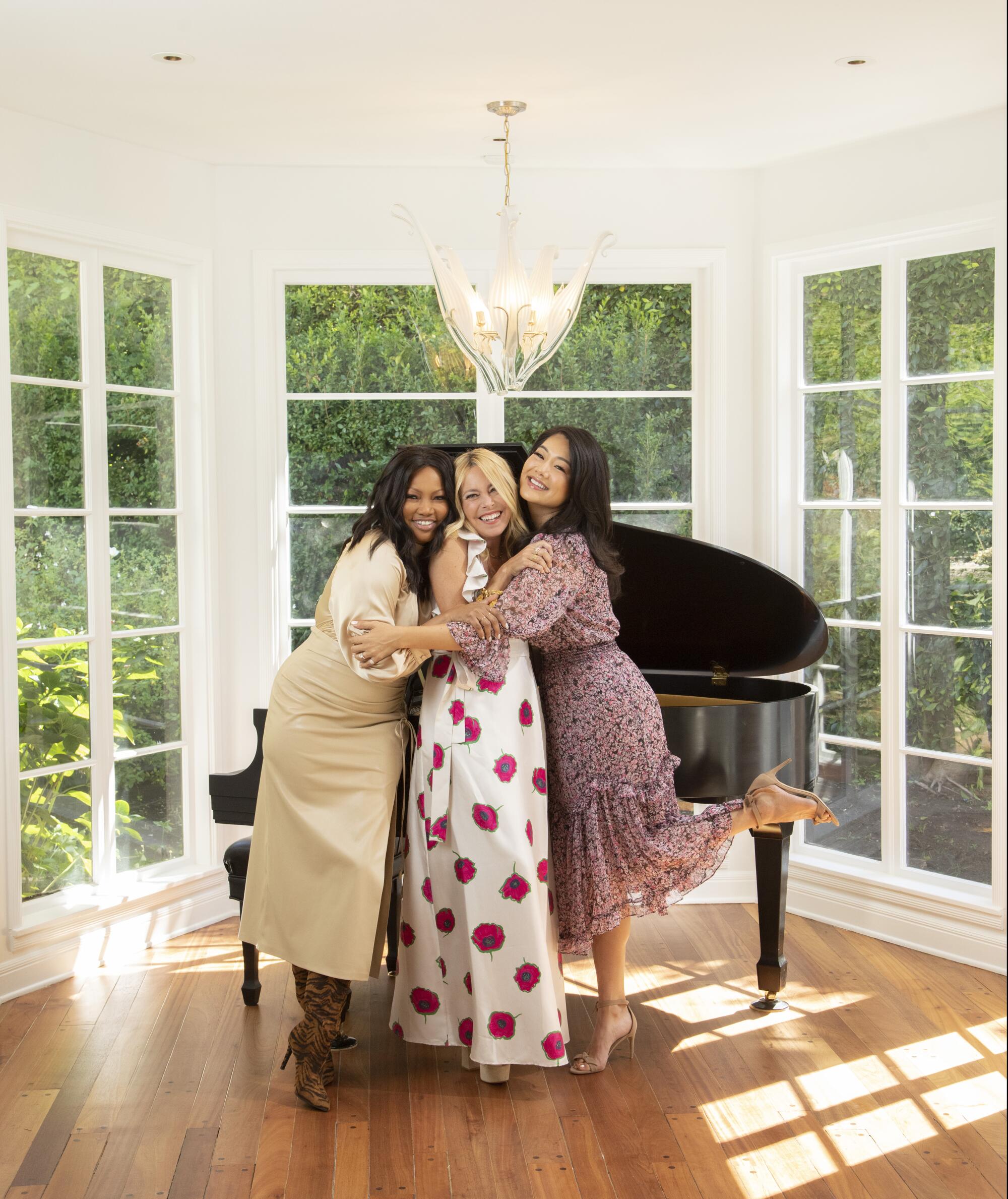
Sutton, there was that moment early in the season where Crystal challenged you on the framing of “I don’t see color.” In the moment, you were defensive. But looking at how things unfolded, could you see how it wasn’t meant as an indictment of you but meant to show the flaws of that logic?
Stracke: One hundred percent. That was a conflamma that I learned a lesson from — seriously. As a white woman, this is how we do, and this is how we can change.
Beauvais: And what was great, the producers didn’t want to shy away from having these conversations because they were happening in the real world anyway. It’s not like we were pretending or bringing it up just to talk about it, but they were very good about letting us have those conversations.
It was the start of some ongoing tension between Sutton and Crystal — though it now feels like it happened in another season, with everything that has transpired since. There was the coat incident, where Crystal expressed feeling like her space had been violated. As it’s all happening, are you worried and thinking, “Is this going to be what the whole season is about?”
Kung Minkoff: Yeah, it was a lot. I appreciated that Sutton had called me the day after everybody got exposed [to the coronavirus]. We had this sort of 16-day quarantine and, I know it sounds harsh, but it was like our blessing.
Stracke: It was. It was. I was like, “We gotta stop.”
Kung Minkoff: I was like, “Trust — I don’t want this to go on; I don’t know why it kept going on.” So I was so happy that [Sutton] called. We had to hear each other out outside of this stressful camera [situation], with everyone around — we really needed to have our own private conversation.
Have you worn those “ugly leather pants” since?
Kung Minkoff: I bought another pair because I knew they were going to sell out.
More seriously, things took a turn this season once we reached election day and Erika’s divorce filing set off a series of questions. It’s one thing to watch it as a viewer and know a little bit of what to expect. But living it must have been a whirlwind.
Stracke: I immediately felt sorry for her. Because divorce is hard and they have been married for so long. I was married for 17 years. And they were married for 20 years. And it’s sad. Divorce is sad. And I don’t think any of us exactly knew why. You just instantly start going through your mind: I wonder what happened here for her to do that?
Kung Minkoff: I go into like a self-absorbed place because I’m like: OK, I’m brand-new. The other girl with a big age gap [in her marriage] is getting divorced. Why am I here? I don’t want that. I’m not here to get divorced. I’m here to show my family in a positive light. You hear the stories of, it’s “the curse,” right? I was like, Oh my God, this is just designed to be this tornado of negativity. I didn’t know if we should continue because that really scared me.
This became a bit of a true-crime season for some viewers. They were poring over details, analyzing everything Erika said or did to piece it all together. Did it feel like that for you guys in the moment?
Beauvais: I didn’t feel that at all. In the beginning ...
[Stracke shoots her a look.]
Beauvais: Wait, wait, wait. In the beginning ...
Stracke: The minute I read that L.A. Times article I just ...
Kung Minkoff: I read it and thought, “Now this season is going to be about: This woman’s husband goes to prison.” Production told us about it [the article]. We didn’t know about it because we were still at the hotel, and they were at the house. So production’s like, “I need you guys to open your text.”
It was too long for some, we learned.
Stracke: I went and got it in paper. I read it three times on my phone, and then went and got the paper version. Because I needed to see it in paper.
“Real Housewives of Beverly Hills” stars Kyle Richards, Erika Girardi, Lisa Rinna, Denise Richards, Dorit Kemsley and more talk quarantine and Season 10 drama.
There was the meeting the cast had without Erika that we saw. But were there conversations as a group with producers or one-on-one about the situation?
Beavuais: We never thought about stopping production. We can’t. That’s out of our hands.
Stracke: When I left Kyle’s house in La Quinta, my first call was to production. When I read the article the fourth time, I got concerned because we were hearing stories from one side, and I was like, “Are we gonna keep hearing stories? On camera? Do we need an attorney to kind of help us, guide us through filming?” That was really my biggest question. And they said: “This is such a great question. Why don’t you get the girls together?”
Beauvais: And then you called me and I was like, “Oh, my God, I never thought about that. We could be implicated.”
Stracke: And using the word “alleged.”
Kung Minkoff: I guess because I had seen other reality shows and there’s people who do all these crazy things, I was like: It doesn’t affect the other people.
Stracke: I am a very private person and I got freaked out.

We’ve seen these conversations happen in bits and pieces in the “Real Housewives” franchise. But this season of “Real Housewives of Beverly Hills” has really cracked open the conversation about the power dynamics in these marriages of wealth — what people know or don’t know, particularly the wives, about the finances. What has seeing all this play out illuminated for you?
Kung Minkoff: I had that scene with Lisa and Erika that was like, I think, the beginning of the wife conversation, and I was getting pushback because I said I don’t think I know everything. I’m the saver. I’m ambitious, but I get nervous about finances. So, you know, he knows I’m not going around spending money. So I don’t feel like he takes care of everything. Every relationship is different, every dynamic’s different. And yes, I think there’s a lot of marriages that have that kind of negative Erika was telling us about, but for me, it didn’t change. I actually felt more secure in my marriage.
Stracke: Really, when you go through the forensics, you do find much stuff. I hope there’s a takeaway, especially for young women, or any woman getting married, [which] is: You really need to know who you’re marrying. And you really need to have the veil lifted because you can get into a situation very easily like this. Know what you’re getting into and be safe — be safe in all aspects before you get into a marriage. Because, you know, the repercussions can be very, very serious, as we’re seeing.
A scene that didn’t make it to air but made the rounds on social media was that conversation where you, Sutton, share that you offered Erika money after the divorce. It seems you learned a lot from your divorce in terms of how quickly your financial situation can change.
Stracke: We’re very private people — and not because we were hiding anything. I get very uncomfortable talking about money, and this doesn’t have anything to do with money. It doesn’t matter how much money you have. When I was going through my divorce, my attorney told me, “Are you prepared to have a friend help you during the time of divorce before you get your settlement? Because you can get cut off very easily when you’re going through a divorce.” I didn’t have a job. I didn’t have money coming in. And that’s what I offered to Erika. I think anybody going through a divorce needs to have a friend. If it’s just to get you through a couple of months.
Beauvais: I think when we get married, although we love and we trust, I think women tend to, if you slide a piece of paper in front of them, we sign, right? So I think what it showed me is that we need to stop, whether it’s business, whether it’s a relationship, and really read what you’re signing.
Bravo’s glittery reality franchise has always encouraged competitive consumption. But cast members’ financial ‘smoke and mirrors’ can lead to trouble.
Did you expect Erika to really address any of her situation on camera, or even off camera, given the nature of the accusations and the legal implications?
Kung Minkoff: I don’t know her well enough that she would tell me anything off camera. I just take people at face value, so I just kept believing it. And then she’s talking about Alzheimer’s and I just kept crying about it because I kept connecting to that. It’s so beyond comprehension to me that people would know or be involved. So when you tell me that, I assume that it’s like, “Oh, your husband did this.” I just always assumed that it was just him. Her stories were wacky, though.
The viewers really tried to make sense of the stories. People were making diagrams, they were Google Map searching, trying to understand the crashes.
Beauvais: There were people who drove the street ...
Stracke: Should we do that this afternoon?
How has it been navigating the fandom and the way they are dissecting things during a season like this one?
Kung Minkoff: Before I said yes to doing the show, I called Denise [Richards’] agent because he’s at my husband’s agency. I remember he said, the thing about the show is that the fandom is so extreme. Until you’re on it, you don’t understand how wildly popular it is.
Stracke: [The fans] love it, and that’s what’s so great. I think they can be very sweet. They can be a bit much. But they’re usually super sweet. I find it fascinating because they think they know you. And you want to give them so much. And I think that’s what’s interesting about the three of us is, we are truly ourselves. I can’t do anything but be myself. And I don’t have the bandwidth to even try to come up with some sort of other character — I mean, God knows I have enough to deal with than come up with some other persona. If I’m having a bad day, I’m having a bad day. If I’m going through menopause, I’m going through menopause and acting like a crazy person. That’s me. And so I think when you do that, if you’re truly authentic, then they really, truly kind of do know you.
Do you think there’s something to the idea that viewers are in it to watch you rise and fall? And how do you feel about that?
Beauvais: Yes.
Stracke: Everybody likes a rise and fall. It started with “The Great Gatsby.”
Beauvais: It started before that. And that’s what can be scary as well. They can love you one day and and not the next. That’s reality.
I want to talk about this reunion. It’s four parts.
Stracke: Crystal and I have had back and hip issues afterwards.
Kung Minkoff: It was a lot. We were very close on a couch.
Beavais: We should have been in separate chairs.
Do you think the right questions were asked? Do you think viewers will be satisfied with the answers we get with regards to Erika?
Stracke: I don’t want to spoil it for anybody. But there’s one thing that I’m still a little like, “Really?!” — about how I was treated about asking questions and then other people were not treated the same way.
What do you think of how Sutton was treated this season in that respect, Garcelle and Crystal?
Beauvais: Oh, I didn’t like it at all and that’s my one regret, and I said that in the reunion: I wish I had stood up for her at Kathy’s dinner because that was completely out of control. Erika’s back was to me so I couldn’t see her face, but obviously I could feel her energy and it was enough. It was enough.
Kung Minkoff: I for sure was still feeling the residual negativity, or whatever it’s called, of our issue and had we not had that, for sure, I would have been more protective of you.
Stracke: Yeah, we weren’t friends yet.
Kung Minkoff: We weren’t there yet. I know if we were friends like today, I would have totally defended you. I regretted that too.
How are you feeling about the prospects of returning?
Kung Minkoff: For me, it’s quite scary. I sometimes just feel like I live my life very positively and I have a really good life and this really, like, brings a lot of negativity sometimes, and even though my kids don’t see it, I feel the energy being thrown at them. And I’m like: Why am I doing it? Like, what is this for? And so I grapple with that a lot.
Beauvais: Oh. boy ... I’m on the fence, honestly.
Stracke: I’m a glutton for punishment. There’s something seriously wrong. It’s the highs and the lows. At the end of the day, it’s this weird bond that we all fight, and to be honest, to sit on this couch with these ladies is, I mean, such a blessing because I have truly a great friendship with [Garcelle]. And then I get to know [Crystal]. I would not know these women had I not done this. I love meeting people and I love forming friendships with women and close friendships. And let me tell you, this show, you don’t get closer.
Final question. How long should this piece be if we want to get your cast members to read it?
Stracke: A paragraph. Do it as Instagram Stories.
Kung Minkoff: A caption with a photo.
‘The Real Housewives of Beverly Hills’
Where: Bravo
When: 8 p.m. Wednesday
Rating: TV-14-DL (may be unsuitable for children under the age of 14 with advisories for suggestive dialogue and coarse language)
More to Read
The complete guide to home viewing
Get Screen Gab for everything about the TV shows and streaming movies everyone’s talking about.
You may occasionally receive promotional content from the Los Angeles Times.
